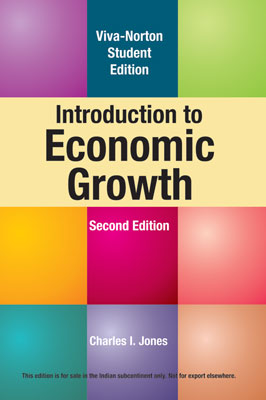
Introduction to Economic Growth, 2/e
Introduction to Economic Growth, 2/e
₹535.50 ₹595.00 Save: ₹59.50 (10%)
Go to cartISBN: 9788130922904
Bind: Paperback
Year: 2020
Pages: 256
Size: 6 x 9 Inch
Publisher: W. W. Norton & Company
Published in India by: Viva Books
Exclusive Distributors: Viva Books
Sales Territory: India, Nepal, Pakistan, Bangladesh, Sri Lanka
Praise for the First Edition:
"Charles I. Jones has laid out 40 years of work on growth economics in a clear, compact, civilized package. You get theory, you get facts, and you get a picture of what it"s all about, in a form very suitable for undergraduates. It is not a bad way to start integrating macro and micro."
—Robert M. Solow, Massachusetts Institute of Technology
"At last, someone has shown that the entire scope of the modern theory of growth can be brought into the undergraduate classroom. Charles I. Jones has written a wonderful introduction to the subject, one that takes the reader to the frontier of current research."
—Paul Romer, Stanford University
Description:
One of the hottest fields in contemporary macroeconomics, economic growth is both fascinating to theorists and critically important to policy makers. In Introduction to Economic Growth—the only text in the field designed specifically for advanced undergraduates—Charles I. Jones explains in clear, direct language how economists have come to understand the long-run growth of economies. Beginning with empirical evidence—how rich are the rich countries, how poor are the poor, and how fast do the rich and poor countries grow? —Professor Jones then presents the major theories of economic growth, from the Nobel Prize-winning work of Robert Solow to the new growth theory that has ignited the field in recent years.
Contents:
Chapter 1: Introduction: - The Facts of Economic Growth
• The data of growth and development
• Other • Stylized facts?
• The remainder of the book
Chapter 2: The Solow Model
• The Basic Solow Model: Solving the Basic Solow Model • The Solow Diagram • Comparative Statics • Properties of the Steady State • Economic growth in the simple model
• Technology and the Solow Model: The Solow Diagram with technology • Solving for the steady state
• Evaluating the Solow Model
• Growth Accounting, the productivity slowdown and the new economy
• Appendix: Closed-form solution of the Solow Model
Chapter 3: Empirical Applications of Neoclassical Growth Models
• The Solow Model with human capital
• Convergence and explaining differences in growth rates
• The evolution of the income distribution
Chapter 4: The Economics of Ideas
• What is technology
• The economics of ideas
• Intellectual property rights and the industrial revolution
• Data on ideas
Chapter 5: The Engine of Growth
• The basic elements of the model: Growth in the Romer Model • Growth effects versus level effects • Comparative statistics: A permanent increase in the R & D share
• The economics of the model: The final-goods sector • The intermediate-goods sector • The research sector • Solving the model
• Optimal R & D
• Appendix: Solving for the R & D Share
Chapter 6: A Simple Model of Growth and Development
• The basic model
• Steady-state analyses
• Technology transfer
• Understanding differences in growth rates
Chapter 7: Social infrastructure and long-run economic performance
• A business investment problem
• Determinants of F
• Determinantsof II
• Which investments to make?
• Empirical evidence
• The choice of social infrastructure
• Growth miracles and disasters
Chapter 8: Alternative theories of endogeneous growth
• A simple endogenous growth model: The 'AK • Model
• Intuition and other growth models
• Externalities and AK models
• Evaluating endogenous growth models
• What is endogeneous growth?
Chapter 9: Natural resources and economic growth
• Land in the Solow Model
• Nonrenewable resources: Setup • The balanced growth path
• Quantifying the importance of natural resources
• Prices as indicators of scarcity
• Implications and explanations of declining factor shares
Understanding economic growth
• Why are we so rich and they so poor?
• What is the engine of economic growth?
• How do we understand growth miracles
Appendix A: Mathematical review
Appendix B: Readings of interest
Appendix C: Data on economic growth
About the Author:
Charles I. Jones is associate professor of economics at the University of California at Berkeley and a leading scholar in the field of economic growth. He received his A.B. from Harvard University and his Ph.D. from the Massachusetts Institute of Technology






